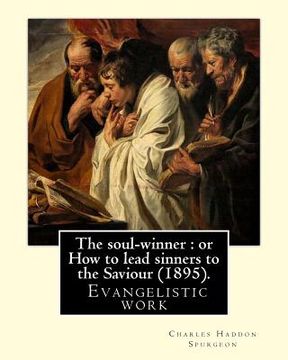The soul-winner: or How to lead sinners to the Saviour (1895). By: C. H. Spurgeon: Charles Haddon Spurgeon (19 June 1834 - 31 January 1 (in English)
Synopsis "The soul-winner: or How to lead sinners to the Saviour (1895). By: C. H. Spurgeon: Charles Haddon Spurgeon (19 June 1834 - 31 January 1 (in English)"
Charles Haddon Spurgeon (19 June 1834 - 31 January 1892) was an English Particular Baptist preacher. Spurgeon remains highly influential among Christians of various denominations, among whom he is known as the "Prince of Preachers". He was a strong figure in the Reformed Baptist tradition, defending the Church in agreement with the 1689 London Baptist Confession of Faith understanding, and opposing the liberal and pragmatic theological tendencies in the Church of his day. He also famously denied being a Protestant, and held to the view of Baptist Successionism. Spurgeon was the pastor of the congregation of the New Park Street Chapel (later the Metropolitan Tabernacle) in London for 38 years. He was part of several controversies with the Baptist Union of Great Britain and later he left the denomination over doctrinal convictions.In 1867, he started a charity organisation which is now called Spurgeon's and works globally. He also founded Spurgeon's College, which was named after him posthumously. Spurgeon was a prolific author of many types of works including sermons, an autobiography, commentaries, books on prayer, devotionals, magazines, poetry, hymns, and more. Many sermons were transcribed as he spoke and were translated into many languages during his lifetime. Spurgeon produced powerful sermons of penetrating thought and precise exposition. His oratory skills held his listeners spellbound in the Metropolitan Tabernacle and many Christians hold his writings in exceptionally high regard among devotional literature. Early life: Born in Kelvedon, Essex, Spurgeon's conversion from nominal Anglicanism came on 6 January 1850, at age 15. On his way to a scheduled appointment, a snow storm forced him to cut short his intended journey and to turn into a Primitive Methodist chapel in Artillery Street, Newtown, Colchester where, he claimed, God opened his heart to the salvation message. The text that moved him was Isaiah 45:22 - "Look unto me, and be ye saved, all the ends of the earth, for I am God, and there is none else." Later that year on 4 April 1850, he was admitted to the church at Newmarket. His baptism followed on 3 May in the river Lark, at Isleham. Later that same year he moved to Cambridge, where he later became a Sunday school teacher. He preached his first sermon in the winter of 1850-51 in a cottage at Teversham while filling in for a friend. From the beginning of his ministry his style and ability were considered to be far above average. In the same year, he was installed as pastor of the small Baptist church at Waterbeach, Cambridgeshire, where he published his first literary work, a Gospel tract written in 1853.In April 1854, after preaching three months on probation and just four years after his conversion, Spurgeon, then only 19, was called to the pastorate of London's famed New Park Street Chapel, Southwark (formerly pastored by the Particular Baptists Benjamin Keach, theologian John Gill and John Rippon). This was the largest Baptist congregation in London at the time, although it had dwindled in numbers for several years. Spurgeon found friends in London among his fellow pastors, such as William Garrett Lewis of Westbourne Grove Church, an older man who along with Spurgeon went on to found the London Baptist Association. Within a few months of Spurgeon's arrival at Park Street, his ability as a preacher made him famous. The following year the first of his sermons in the "New Park Street Pulpit" was published. Spurgeon's sermons were published in printed form every week and had a high circulation. By the time of his death in 1892, he had preached nearly 3,600 sermons and published 49 volumes of commentaries, sayings, anecdotes, illustrations and devotions. Immediately following his fame was criticism. The first attack in the press appeared in the Earthen Vessel in January 1855.....

